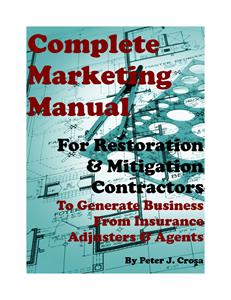The Importance of GPS for Your Company Operations




Trust is critical in your business - you must have trust within your company in order to be successful. It takes a long time to build up trust and it takes a New York second to lose it! I know you want to trust that all members of your company are all doing exactly what they are supposed to be doing. But still, wouldn’t it be nice if there was a way to spot check that they were living up to the agreement? You, more than any other entity, are much more trusting of your people. You interviewed them, you hired them and you work with them every day.
The first time that the policy holder comes in contact with your company is when they have just had a major jolt in their life. They probably do not know you or your company. They have a lot of different companies promising them things and they are worried about who they can and cannot trust!
The insurance company may or may not know who you are, depending on the situation. If you are new to them, they are just as concerned - if not more so - than the policy holder is.
As a result of all of the intense change in the policy holder’s life, the insurance company is also trying to please the policy holder and at the same time protect their investment with their client from people who are not trustworthy.
So, you come along and sign the contract to restore the policy holder to their original condition and the insurance company agrees to work with you on behalf of their client. Now, both the policy holder and the insurance company are watching you like a hawk! You’ve made promises to them, they want you to keep your promises and they are trusting you that you will keep your promises.
Now, enter your employees! It goes without saying that there’s a very strong need for your employees to carry out what your company has promised to do.
And that’s where GPS comes in. Here are 20 ways that GPS can help you in this situation and also give you the ability to know what is happening with your employees in real time:
- You know when they leave the company premises.
- You know how long they took to get to the job.
- You know what route they took.
- You know what stops they made.
- You know how long they were at the stop(s).
- You know where they stopped.
- You know what speeds they drove at and whether they were under, at or over the existing speed limit(s).
- You know how, when and where they applied the brakes.
- You know how many times they opened doors in their vehicle.
- The GPS can send e-mails as to arrival and departure times to and from the job.
- Work times can be sent to and integrated with your existing software.
- You can know for certain whether they are working efficiently and effectively, which leads to being on time and on budget.
- The software and its metrics can be sent to whoever you want it to be sent to in real time.
- This becomes an extremely valuable tool as to whether or not your Employee Policies & Procedures Manual is being adhered to.
- In today’s work environment, this information is a major tool in workman’s comp claims, insurance driving records and therefore insurance premium rates.
- GPS tracks and reports the vehicle maintenance.
- GPS documents total accountability of the vehicle and its occupants.
- GPS makes business accountable and transparent.
- GPS makes business easier for all concerned to understand.
- You know that all of these actions are being tracked, keeping everyone in the heads up mode!
Let me give you three real life examples of situations where the GPS was extremely helpful in assisting and documenting situations that the company needed to be very aware of:
-
A driver called in on a bad weather day that he’d just had an accident, resulting in his vehicle sliding off of a remote country road and he needed assistance quickly. With the GPS, the company was able to rapidly direct assistance to the site of the accident. The accident occurred in very low temperatures and, as a result, the driver received quick assistance. Without that quick assistance, it could have been much more threatening than it already was.
-
An owner asked his employee to meet with him at 7 a.m. at the company office, before work started at 8 a.m. The employee called in to the owner at 6:30 a.m., saying that he was stuck in traffic. The employee called in again at 6:55 a.m. saying that he was still stuck in traffic, but was closer to the office. The owner was a little frustrated and checked the GPS position of the company vehicle. Surprise, surprise - the company vehicle was still in the employee’s driveway! At 7:15 a.m. the employee called in for the third time to say that he was still stuck in traffic. The owner again checked his location - the company vehicle was just down the street from the office, parked at the local doughnut shop! The owner went to the doughnut shop, asked the employee for his vehicle keys and then drove the company vehicle back to the office. The employee did not bother asking for a referral when he went looking for a new job!
- A business development associate was discovered to be parking in a parking lot at a new shopping center for five days in a row from 1 p.m. to 3 p.m. every day. There was no cell usage on the person’s phone. There were no log entries in the companies CRM. When asked what the person was doing, it was discovered they were shopping at the center the car was parked at. When reminded that there were no stores yet built around the parking lot, the business development associate said that they were being discriminated against and being picked on. This person also did not ask for a reference when they began searching for a new job!
So what am I trying to say? I want you to trust your people, but for many reasons, I want you to be able to verify that all members of the company are doing what they are supposed to be doing as they are supposed to be doing it!
Here’s to wishing you good choices, profitable business and accountability through transparency.
Looking for a reprint of this article?
From high-res PDFs to custom plaques, order your copy today!










